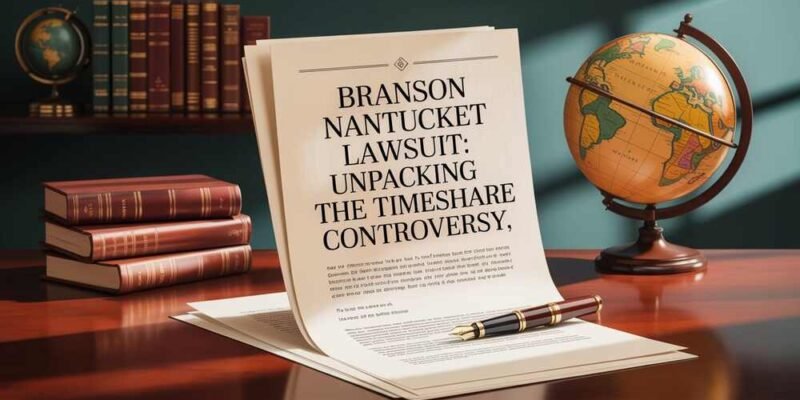Introduction: The Rise and Fall of Branson’s Nantucket
Branson’s Nantucket, a luxury timeshare resort nestled near Table Rock Lake in Branson, Missouri, has long been a sought-after destination for vacationers seeking upscale accommodations. Marketed as a premier vacation ownership opportunity, the resort attracted numerous buyers enticed by promises of flexible vacation options and potential investment benefits. However, beneath the surface of this idyllic retreat lay a series of troubling practices that have culminated in a significant legal battle, now widely referred to as the Branson Nantucket lawsuit.
Allegations of Deceptive Sales Practices
At the heart of the Branson Nantucket lawsuit are allegations of deceptive and high-pressure sales tactics employed by the resort’s sales team. Numerous timeshare owners have come forward, claiming they were misled during sales presentations. Common complaints include being told that the timeshare was not traditional, assurances of easy resale or rental opportunities, and promises of exclusive benefits that never materialized.
One particularly concerning case involves an elderly couple who, according to reports, were persuaded into purchasing multiple timeshares without fully understanding the associated financial commitments. Their daughter later discovered the transactions while reviewing their finances, leading to further scrutiny of the resort’s sales practices.
Legal Actions and Court Proceedings
Class Action Lawsuit Over Closing Costs
A significant development in the Branson Nantucket lawsuit is the class action filed in the Circuit Court of Taney County, Missouri. Plaintiffs Darrell and Kathleen Thompson alleged that Resort Sales Missouri, Inc. and Spinnaker Resorts, Inc. violated Missouri state law by charging unlawful closing costs to timeshare purchasers. The lawsuit claimed that these fees were not adequately disclosed and constituted a breach of consumer protection laws.
The settlement reached in this case resulted in nearly $900,000 being allocated to affected class members, providing some financial relief to those who had been charged these questionable fees.
Branson’s Nantucket vs. Timeshare Law Office LLC
In a separate legal action, Branson’s Nantucket filed a lawsuit against Timeshare Law Office LLC and associated attorneys, accusing them of tortious interference with business relationships. The resort claimed that the defendants advised timeshare owners to cease making payments, resulting in financial harm. However, the Missouri Court of Appeals upheld the dismissal of the case, citing insufficient evidence to support the resort’s claims.
Consumer Complaints and Regulatory Scrutiny
Beyond the courtroom, Branson’s Nantucket has faced a barrage of consumer complaints, many of which have been documented by the Better Business Bureau (BBB). Customers have reported issues ranging from misleading sales tactics to difficulties in canceling contracts and obtaining refunds. The BBB has noted a pattern of complaints that suggest systemic problems within the resort’s sales and customer service operations.
These complaints have drawn the attention of regulatory bodies, including the Missouri Attorney General’s Office, which has been contacted by consumers seeking assistance in resolving disputes with the resort. The accumulation of grievances has contributed to the mounting pressure on Branson’s Nantucket to address its business practices.
Impact on Timeshare Owners
The fallout from the Branson Nantucket lawsuit has had profound effects on timeshare owners. Many find themselves locked into contracts with escalating maintenance fees and limited options for exit. The financial strain, coupled with feelings of betrayal and frustration, has led some owners to seek legal recourse or assistance from timeshare exit companies.
However, navigating the process of exiting a timeshare can be complex and fraught with challenges. Owners must be cautious to avoid scams and should consider consulting with attorneys who specialize in timeshare law to explore their options.
Broader Implications for the Timeshare Industry
The controversies surrounding Branson’s Nantucket have sparked broader discussions about the timeshare industry’s practices. Critics argue that the industry’s reliance on aggressive sales tactics and complex contracts often leaves consumers vulnerable to exploitation. The Branson Nantucket lawsuit serves as a cautionary tale, underscoring the need for increased transparency, robust regulatory oversight, and comprehensive consumer education within the industry.
In response to these concerns, some industry stakeholders are advocating for reforms, including standardized disclosures, cooling-off periods, and more apparent exit strategies for timeshare owners. Such measures aim to restore trust and ensure that consumers are fully informed before making significant financial commitments.
Conclusion: Lessons Learned and Steps Forward
The Branson Nantucket lawsuit underscores the importance of due diligence and informed decision-making when considering timeshare purchases. Prospective buyers should thoroughly research resorts, scrutinize contracts, and be wary of high-pressure sales tactics. For current timeshare owners facing difficulties, seeking legal advice and exploring all available options is crucial.
As the legal proceedings continue and the spotlight remains on Branson’s Nantucket, the case serves as a pivotal moment for the timeshare industry to reflect, reform, and prioritize the rights and well-being of consumers.
Note: This article is based on publicly available information and aims to provide a comprehensive overview of the Branson Nantucket lawsuit. For personalized legal advice, individuals should consult with a qualified attorney.
Do Read: Alex Jones Lawsuit Update 2025 – What You Need to Know













